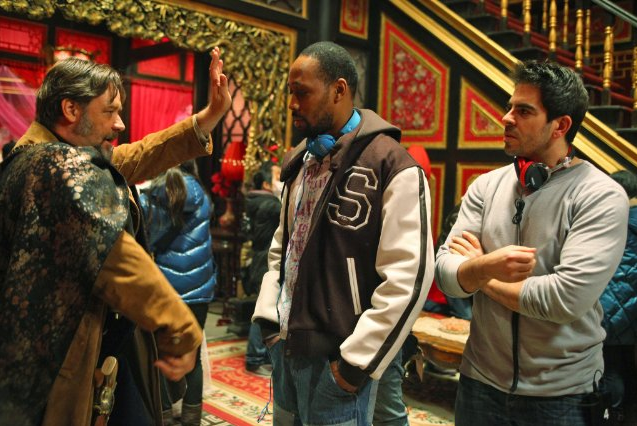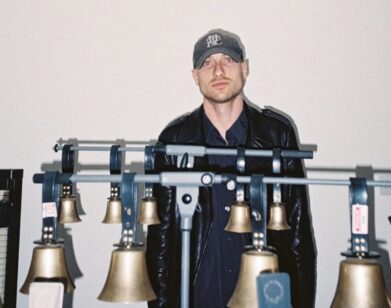RZA, From Wu Tang to Kung Fu

RZA (CENTER) ON THE SET OF THE MAN WITH THE IRON FISTS. IMAGE COURTESY OF CHAN KAM CHUEN
We can’t think of anyone living a cooler life than Robert Fitzgerald Diggs, aka RZA. As founding member and leader of seminal hip-hop collective Wu-Tang Clan, RZA established his production cred and incredible genre-hopping sensibilities in the early ’90s. After becoming a Grammy-winning producer, he took his first step into the film world by composing the score to Jim Jarmusch’s 1999 Ghost Dog: The Way of the Samurai. When Quentin Tarantino approached RZA about orchestrating the soundtrack to Kill Bill: Vol. 1, RZA’s fate was sealed. He embarked on a samurai journey with Tarantino, observing and learning everything he could from the director. After seven years in the making, RZA is finally presenting to the world The Man With the Iron Fists. Co-written with Eli Roth and directed by RZA, the film is a love letter to the various influences that have inspired him since he was an eight-year-old kid growing up in Brooklyn—namely, hip-hop and 42nd Street grindhouse kung-fu flicks.
Starring Russell Crowe and Lucy Liu, and featuring a hilarious breakout performance by Byron Mann as the head villain Silver Lion, the film contains all the gonzo violence, animal-themed clans, and scantily-clad women you would expect from a RZA movie. It’s also a ton of fun. Interview caught up with RZA to discuss his tutelage under Tarantino, the evolution of Iron Fists, and what would be on his perfect triple-feature movie bill.
DREW FORTUNE: What was your first love, the music or the movies? I assume both were great escapes?
RZA: Music came first. I actually heard hip-hop before I saw a movie in a movie theater. I heard hip-hop first, at the tender age of seven, so that came first. I didn’t see a movie until I was eight.
FORTUNE: Did you make an automatic connection between the two, in the sense that you could see how both fit in the other’s world?
RZA: No, I didn’t see that. I didn’t discover how music and film could work together until Jim Jarmusch had me do Ghost Dog. When I think of my album, I was trying to make an audio movie. I didn’t know that these two things had such a poetic wavelength that went together until Ghost Dog.
FORTUNE: When did you first put pen to paper on The Man With the Iron Fists? Do you remember when the first spark of an idea hit?
RZA: I first put pen to paper in the year 2005. I probably came up with about 90 pages by myself, trying to write a screenplay. I didn’t know all the nuances of a screenplay, but I had a story that I saw clearly in my head. I was able to tell that story to my buddy Eli Roth, and he saw it clear in his head. He said if he ever had the chance to help, he would. When the chance came for him to help, he reached out and said “Hey Bobby, you still got that thing? Do you want to get it done?” He came on, and we sat down for about a year and half and wrote it out to a proper screenplay.
FORTUNE: Did you feel pressure throughout the process of adding to this kung-fu legacy that you love so much? Or was the motto, “Let’s just have fun?”
RZA: The pressure came when I had so many people and so many A-listers in my hands. I had to deliver them safely to a location that I promised. So I was basically super-focused, and that was the pressure. I had a passion to write and make the film. It was something I wanted to do. Even writing the first 30 pages, spending the whole year with Eli toning it up into a proper screenplay; that was all done with no money. We weren’t being paid to do it. It was being done as passion. Most things that come out good, in the beginning they have to have a strong passion. Wu-Tang Clan’s first album, 36 Chambers, there wasn’t a lot of money given to make that album. There was a lot of passion to make that album, and this is the same thing.
FORTUNE: You took a samurai/sensei journey with Tarantino. Like any good sensei, did he make you prove your commitment to the project?
RZA: I don’t know, exactly. I never really questioned him about it. All I know is that I asked him, he said yes, and I showed up, yo. I took it serious, and he took it serious. I was never in his way. I was a fly on the wall. He never saw me breathing down his throat. When he wanted to show me something, he’d say “Hey Bobby, come take a look at this,” and we’d both look through the lens. It was a really good energy, and we were kindred spirits.
FORTUNE: In terms of directing and choreography for Iron Fists, did you feel confident going in? There’s a lot of action going on.
RZA: Before we started filming Iron Fists, I had already spent my own money and brought in some other great Asian actors. I brought in Robert Tai, who was the fight choreographer on Five Deadly Venoms. I brought him in for a couple weeks and filmed some stuff with my own money. I showed Eli and my producers what I could do and what I know. The action was no problem for me. I saw a lot of it in my head, though. My action director didn’t want to do some of it! He thought it wasn’t logical. I’m like, “No. It’s logical.”
FORTUNE: Did you have to physically draw out the stuff you saw in your head?
RZA: I had two storyboards, with over 150 pages storyboarded. If you see the storyboards, it’s like 20 comics. We had to cut out a lot of the storyboard scenes, because the budget would never allow some of the stuff that I wanted to do.
FORTUNE: Did the MPAA come down on you at all? Did you have to be reeled in a lot?
RZA: No, I was conscious of it, because Quentin told me a lot about the MPAA. Eli told me the problems he had with them. So I was conscious of it. The best thing I had on this project, and I’m very grateful, is having Eli and Quentin there as a co-pilots. So, when I got to landmines, I had somebody there who had already stepped on one. “No Bobby, that’s a landmine right there. You gotta jump over this one. You gotta be calm and just go through it.”
FORTUNE: What’s the hardest part of directing? As a natural collaborator, I assume working with the actors came pretty easily.
RZA: [laughs] The hardest part is lunch. You don’t ever get your lunch, man. There’s no sitting down as a director. Your brain does not turn off, even when you want it to. People told me about it, and I didn’t believe it until it happened to me. You work 12-13 hours a day, go home to your hotel room, and guess what? You’re fucking up five more hours, thinking about what you’re gonna do the next day.
FORTUNE: Am I crazy, or was Bryon Mann’s performance as Silver Lion inspired by Prince?
RZA: Well, Byron Mann did a screen test that was so cool. He didn’t originally try out for Silver Lion. He tried out for Poison Dagger. But his screen test was so fucking cool that I wanted him to be Silver Lion. He blew me away. The odd thing was to have him evolve into this weird type of guy. With his hair, I can see the Prince in him, I can see the Rod Stewart, and I can see the motherfucking Tina Turner in him. Quentin told me that he thinks I found his star. When I saw him, we had already cast somebody else as Silver Lion. It was a guy who played a lot of roles in kung-fu movies. He already had the part, but would you believe that at the last minute, this guy came back and tried to double his money. He tried to fucking extort me. We already had a deal. I had already seen Byron’s screen test, so I was like, “If this guy wants to break the deal, let him break it. Byron is incredible, and I’d love to have this guy.” I remember pulling Eli aside and saying, “Fuck it. I already got my Christoph [Waltz]. I got a guy that’s gonna break out like Christoph.” Even my wife, who saw the movie for the first time at the premiere, was like, “Yo. Fucking Silver Lion. I love that guy!”
FORTUNE: In the movie, the Pink Blossom brothel is a 24/7 party. Did any of the onscreen debauchery translate to an offscreen party?
RZA: The set was concentrated and super focused. But we did have two parties, one in the middle and one at the end, and my Asian brothers know how to party. We got so drunk and had a good time. We had a party with about 700, 800 people. That’s how big my crew was. It was really a beautiful thing, man. I’m so happy to be inspired by the Asian culture and these movies and then be able to go back and give back by bringing a movie to them, and have people on my payroll and bringing actors from their culture to the silver screen in America. It’s been a blessing for me.
FORTUNE: If you were to plan your perfect triple feature, what would be on the bill?
RZA: I’d put Five Deadly Venoms on the bill. I’d put Kill Bill on there as well. I’d top it off with The Man With the Iron Fists, as of now. These are the ones where I’d be like “Yo, you gotta see these. These are a great collaboration of kung-fu and samurai movies.” Five Deadly Venoms will set you up into the world and take you back to the classics. If I could do a fourth one, I’d do 36 Chambers, of course. Kill Bill shows you the animation, as well. I wrote a big animation scene for Iron Fists, but we couldn’t afford all that. Kill Bill captures the anime, Japanese, and kung fu. Iron Fists captures the kung fu, the sci-fi, the Star Wars, the comic books, and the hip hop. So, that’s the way I would do it for this year. Next year, who knows?
THE MAN WITH THE IRON FISTS IS NOW PLAYING IN LIMITED RELEASE.






